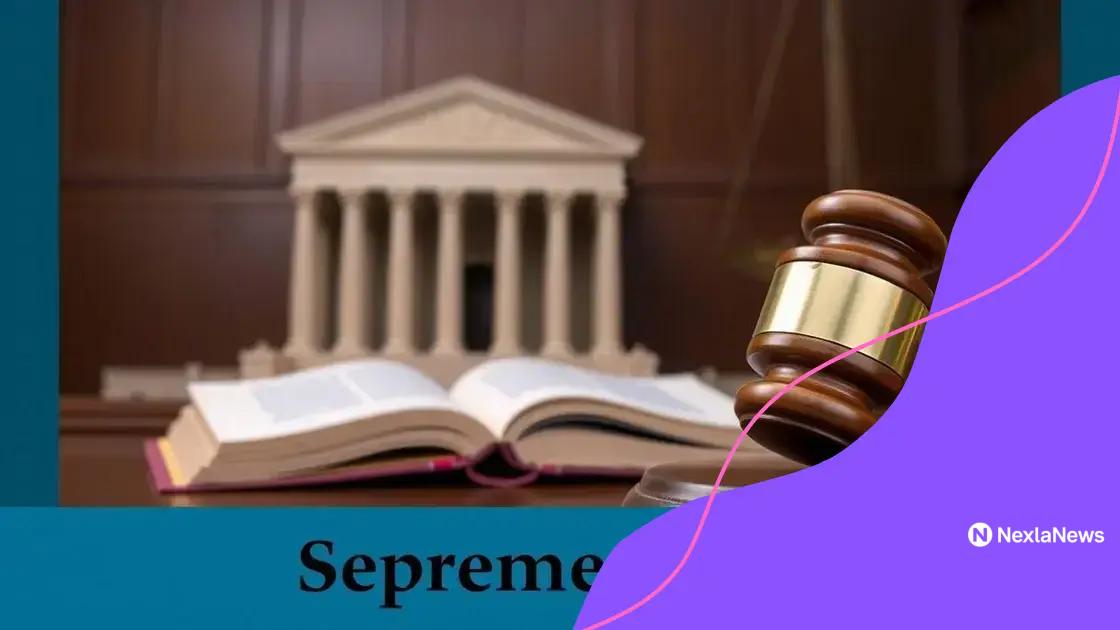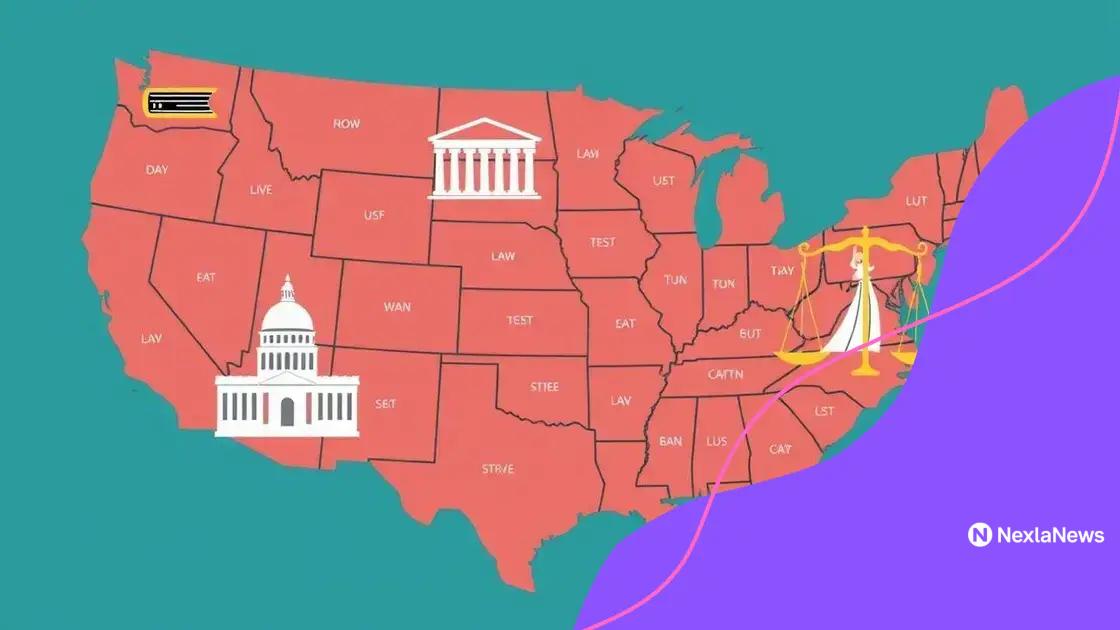Supreme Court ruling reshapes the legal landscape

The Supreme Court ruling significantly impacts civil rights, state laws, and social movements, prompting increased advocacy and legal scrutiny as society adapts to the new legal landscape.
The Supreme Court ruling has the potential to change the way laws are interpreted in our society. What does this mean for you and your rights? Let’s dive into the details of this significant decision.
Overview of the Supreme Court ruling
The Supreme Court ruling has become a focal point in discussions about law and justice in our country. This landmark decision is not just a legal formality; it has real-world implications for millions of people. By understanding the ruling’s overview, we can better appreciate its impact on various aspects of society.
Key Points of the Ruling
This decision addresses several critical areas of law. Here are the key points you should know:
- The ruling clarifies existing legal precedents.
- It affects future legal interpretations and court decisions.
- It has significant implications for constitutional rights.
- The ruling outlines how laws must conform to the new standards.
Understanding these points helps illustrate the weight of the decision. It modifies our legal framework and sets a new course for future cases. This ruling invites further examination of how laws shape our daily lives. Legal experts are already discussing the various outcomes and predictions that stem from this major shift.
Impact on Society
The impact on society cannot be understated. Many individuals will feel the effects of this ruling in their personal and professional lives. For instance, rights previously taken for granted may now be subject to new interpretations. It’s crucial to analyze how this might change people’s access to justice.
Furthermore, the ruling has sparked debates that could lead to additional legislation or amendments. These discussions bring forth diverse opinions, showcasing the dynamic nature of law. As we navigate this changing landscape, staying informed about the ramifications of the Supreme Court ruling will be vital.
Key implications for civil rights
The recent Supreme Court ruling carries significant implications for civil rights across the nation. Understanding how this ruling affects individual liberties and protections is essential. As various communities await clarity, the ruling’s impact becomes clearer, shaping future legal landscapes.
Rights Affected by the Ruling
The ruling directly influences several key rights that protect individuals from discrimination. Here are some rights that may be notably impacted:
- Freedom of speech, which could face new limits.
- Equal protection under the law for marginalized groups.
- Access to fair trials and due process.
- Anti-discrimination laws that uphold equality in diverse areas.
As a result, many advocates are concerned about how these changes will influence daily life. For instance, individuals may find themselves in new legal battles regarding their rights. Furthermore, the ruling does not exist in isolation; it intersects with laws at both the state and federal levels.
Potential Outcomes for Communities
Various communities will experience the fallout differently. Some groups are more vulnerable to the effects of this ruling, prompting heightened advocacy and mobilization. Social justice organizations are already preparing to address the challenges that arise.
The potential outcomes extend beyond mere legal adjustments. They also affect the societal perception of civil rights. As citizens reflect on this ruling, discussions regarding equality and justice will likely intensify, leading to a greater awareness of civil liberties. This dynamic climate can inspire new legislation to protect rights further.
How the ruling affects state laws

The recent Supreme Court ruling has substantial effects on state laws, creating a ripple effect across various jurisdictions. This change will challenge states to reassess how they establish and implement laws in line with this new precedent.
Key Areas of Impact
Different aspects of state law will feel the consequences of this ruling. Let’s explore some of the key areas:
- **Education policies:** States may need to adapt their educational laws to comply with new legal interpretations.
- **Housing regulations:** Changes in housing policies can arise, affecting how states deal with discrimination and zoning laws.
- **Law enforcement practices:** The ruling could lead to shifts in law enforcement protocols, especially regarding civil liberties.
- **Labor laws:** States may have to review their labor regulations to ensure they uphold new standards of worker rights.
Each state has its unique legal environment, making the interpretation of this ruling varied. This will create a situation where legal challenges arise as states grapple with compliance. For instance, states might face lawsuits based on conflicting interpretations of the law.
Challenges for State Legislators
State legislators are now faced with the challenge of adapting to this ruling. They must navigate through public opinion, legal implications, and existing statutes. As they work to implement new laws, their constituents will likely voice differing opinions.
Moreover, the legislative process can be slow, leading to uncertainties while states adjust. Legal experts stress the importance of clear communication from state officials to ensure that residents understand how their rights may change. This ruling could not only redefine state laws but also influence upcoming elections as lawmakers respond to these challenges.
Responses from legal experts
The recent Supreme Court ruling has sparked various responses from legal experts across the country. Their insights are vital for understanding the broader implications of this landmark decision. Many experts have focused on how the ruling could reshape legal precedents and societal norms.
Expert Opinions on Legal Precedents
Many legal analysts suggest that this ruling will redefine existing legal precedents significantly. Some key points include:
- **Potential for appeal cases:** Legal experts believe this decision will lead to numerous appeals and challenges in lower courts.
- **Impact on constitutional interpretations:** The ruling may alter the interpretation of rights under the Constitution.
- **Future legislative changes:** Experts anticipate that legislators will respond quickly to adapt state laws in line with the ruling.
- **Increased litigation:** The ruling could result in a surge of new lawsuits as individuals seek to interpret their rights.
Many experts agree that this is not just a legal matter; it is a social issue that could influence people’s lives profoundly. As discussions evolve, these opinions will guide how society navigates the new legal landscape.
Concerns Raised by Scholars
Legal scholars have also expressed concerns about the implications of the ruling. Their worries include:
- **Marginalization of vulnerable groups:** Some experts worry that the ruling might lead to adverse effects for minority groups.
- **Inconsistent application of laws:** There are fears that different states may interpret the ruling unevenly, creating a patchwork of laws.
- **Long-term societal effects:** The long-term impacts on civil rights and public policy remain elusive and troubling to many advocates.
- **Public trust in the legal system:** This ruling may affect public confidence in the fairness of the judicial process.
As these discussions progress, legal professionals emphasize the importance of ongoing dialogue. They recognize that public understanding and reactions will play a crucial role in shaping the future after this significant ruling.
Future considerations and predictions
The implications of the recent Supreme Court ruling extend far into the future, prompting legal scholars and activists to consider what lies ahead. The decisions made today can shape laws and societal norms for years to come. Thus, understanding potential future considerations is crucial.
Shifts in Legal Precedents
Experts predict that this ruling could lead to shifts in legal precedents. This might manifest in various ways:
- **Increased judicial scrutiny:** Courts may begin to scrutinize laws more closely in light of the ruling.
- **New legal interpretations:** Judges could interpret existing laws differently, creating a new judicial landscape.
- **Potential for landmark cases:** Future cases could arise as individuals challenge decisions influenced by the ruling.
- **Legislative push:** Lawmakers may feel pressured to create new legislation to respond to the ruling.
These possibilities show that the legal landscape is likely to remain dynamic as interpretations evolve and new challenges emerge. As cases make their way through the courts, we may witness significant changes in the legal fabric of our society.
Impact on Social Movements
The ruling may also impact various social movements. Advocacy groups are likely to mobilize in response to the changes spurred by the ruling. Many organizations might work towards:
- **Strengthening protections:** Activists will push for enhanced protections based on the ruling’s implications.
- **Raising public awareness:** Campaigns will inform the public about their rights and potential changes in the law.
- **Engaging in policy discussions:** Advocacy groups may enter dialogues with lawmakers to protect civil liberties.
- **Collaborating across sectors:** Diverse coalitions might form to address broader issues highlighted by the ruling.
The future will likely see both challenges and opportunities. On one hand, the ruling may lead to swift legal changes; on the other, it could catalyze a wave of activism aimed at ensuring justice and equality.
FAQ – Questions about the Impact of the Supreme Court Ruling
What are the main implications of the Supreme Court ruling?
The ruling has significant implications for civil rights, state laws, and future legal interpretations, affecting how laws are enforced.
How might this ruling affect my rights?
Depending on your situation, the ruling may redefine certain rights, potentially leading to changes in how laws apply to you.
What should advocacy groups do in response to the ruling?
Advocacy groups are expected to mobilize, raise public awareness, and push for stronger protections for civil rights affected by the ruling.
How can I stay informed about changes resulting from this ruling?
Keeping up with current news, following relevant organizations, and participating in community discussions can help you stay informed.
